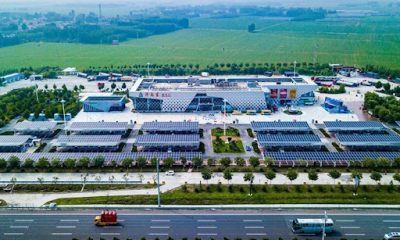News
Green development presents bright prospects for Inner Mongolia
By Wu Yong, People’s Daily
Eco-environmental conservation and green development have gained traction in north China’s Inner Mongolia autonomous region over recent years.
Grassland is under great natural regeneration thanks to a subsidizing policy aiming at ecological protection, which has been implemented for a dozen years.
Commercial logging is banned. Therefore, its Daxing’anling forest area, the largest state-owned forest area in China, is free from lumbering activities.
The Kubuqi Desert in Inner Mongolia has turned green today and is listed as a model of desert control by the United Nations, and the water coverage of the autonomous region’s Hulun Lake, Ulansu Lake and Daihai Lake remains stable due to comprehensive management.
Green is a defining feature of Inner Mongolia’s development. Ecological conservation is an obligation of the autonomous region that generates infinite power for its development.
As an important source of energy and strategic resources for China, Inner Mongolia is brimming with vitality.
It ranks first in the country in terms of total installed capacities of power and new energy. Making use of its advantages to achieve higher development efficiency, the autonomous region boasts a strong modern energy economy.
Inner Mongolia has made remarkable progress in the development of wind and photovoltaic power generation, transforming from a major producer of fossil energy to one that focuses on new energy.
Last year, it proposed to raise the proportion of the total capacity of renewable energy generation to around 40 percent. Besides, the installed capacity of new energy power is expected to outrun that of thermal power in the autonomous region by 2025.
Inner Mongolia is a national-level production base of agricultural and livestock products. It pursues high-quality development of agriculture and animal husbandry, and develops the two sectors in line with specific conditions.
Over recent years, its consumption of chemical fertilizers and pesticides has turned to constant negative growth, while the region has witnessed a continuous rise in the comprehensive utilization of straws and animal waste, as well as the recycling of mulching film. Inner Mongolia now boasts a higher capability in the supply of green and quality products, including grains, edible oil, coarse cereals, dairy products, beef and mutton.
To work for a beautiful China, Inner Mongolia has designated over half of its land area as ecological protection red-line zones and 70 percent as ecological spaces. It is not a restriction for its development, but mirrors the autonomous region’s firm determination to build a modern industrial system with green features, establish a hub of the new energy industry, and achieve the carbon peaking and carbon neutrality goals.
Giving full play to its advantages, Inner Mongolia autonomous region is striving with sound momentum for a comprehensive green transition in production and lifestyles and laying a solid foundation for future development.
News
TCN Acknowledges 7th Grid Collapse in 2024

The Transmission Company of Nigeria (TCN) has reported its seventh partial grid collapse in 2024. Despite the recurring issue, TCN’s General Manager of Public Affairs, Ndidi Mbah, reassured the public that efforts to restore power are well underway, with about 90% of substations receiving bulk power.
Mbah noted that the Azura Power Station initiated the grid recovery, although a minor setback occurred. However, power supply has been restored to the Abuja region and other key distribution centers. The Ibom Gas Generating Station remained unaffected, continuing to supply power to the South-South region.
An investigation into the cause of the collapse will commence once full grid restoration is achieved.
News
Jigawa Tanker Tragedy: Shettima, First Lady Mourn Victims, Pledge Federal Support

Vice President Kashim Shettima has expressed deep sorrow over the tragic tanker explosion in Jigawa State, which claimed over 100 lives. In a statement issued by his media aide, Stanley Nkwocha, Shettima, on behalf of President Bola Tinubu, extended condolences to the affected families, praying for strength and comfort in their time of grief.
Shettima assured the public that the federal government is mobilizing resources to support the injured and assist those affected. He has directed the immediate deployment of the National Emergency Management Agency (NEMA) to provide aid. The Vice President also stressed the need for a review of fuel transportation safety protocols to prevent future incidents.
In a separate statement, First Lady Oluremi Tinubu offered her condolences to Jigawa Governor Umar Namadi and the people of Jigawa, praying for peace and comfort for the families affected. She called the incident “unfortunate” and extended prayers for the recovery of the injured and the repose of the souls lost in the tragedy.
News
Nigeria Customs Intercepts Arms, Ammunition Worth N9.5bn Over Six Years

The Nigeria Customs Service (NCS) has revealed that it intercepted a total of 10,598 pieces of arms and 114,929 rounds of ammunition valued at N9.58 billion over the past six years. Comptroller General of Customs, Bashir Adewale Adeniyi, made this disclosure during a press conference on enforcement activities in Zone A.
Adeniyi highlighted that 60% of these seizures occurred in 2023, reflecting the Customs’ increased efforts to curb arms smuggling. He also mentioned that recent operations such as Operation Whirlwind and Operation Swift Sting are part of a strategic response to tackle evolving smuggling tactics.
In addition to arms seizures, the Customs CG announced the largest pangolin scale seizure since 2020, with 9,493 kg of scales confiscated in collaboration with the Wildlife Justice Commission. The joint operation led to four arrests across Kano, Kaduna, and Lagos. The NCS continues to intensify efforts against wildlife trafficking, targeting supply routes in northern Nigeria and border areas.
-

 Business14 hours ago
Business14 hours agoOkpella Monarch: Obaseki Ratified Kingmakers Decision, End 5years leadership Vacuum
-

 Banking11 hours ago
Banking11 hours agoFree Food Saga: Akpabio quoted out of context-CSO
-

 Foreign15 hours ago
Foreign15 hours agoSci-tech innovation fuels China’s high-quality development
-

 Entertainment7 hours ago
Entertainment7 hours agoDavido Declares ‘Timeless’ His Best Album
-

 Entertainment7 hours ago
Entertainment7 hours ago‘Adire’ Secures Four Nominations at the Best of Nollywood Awards
-

 Business7 hours ago
Business7 hours agoWike Urges Nigerians to Pay Taxes for Improved Social Services
-

 Foreign9 hours ago
Foreign9 hours agoQinling Mountains better safeguarded with comprehensive digital platform
-

 Foreign9 hours ago
Foreign9 hours agoExpressway service station in Shandong achieves carbon neutrality






